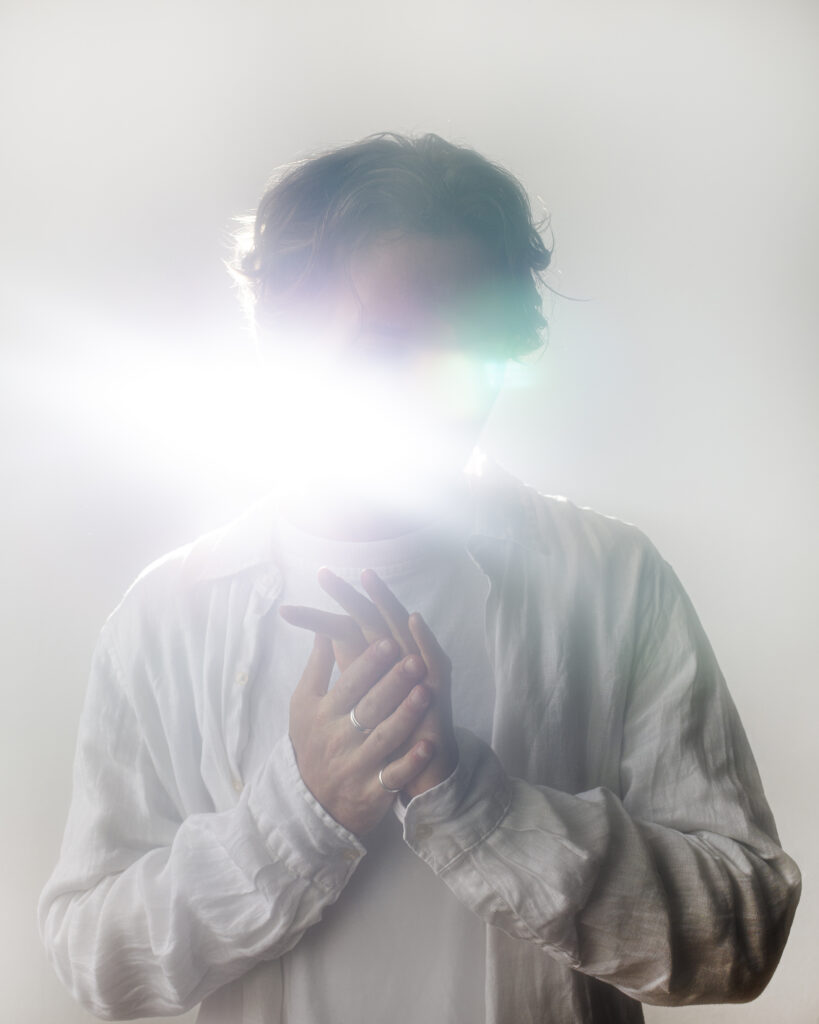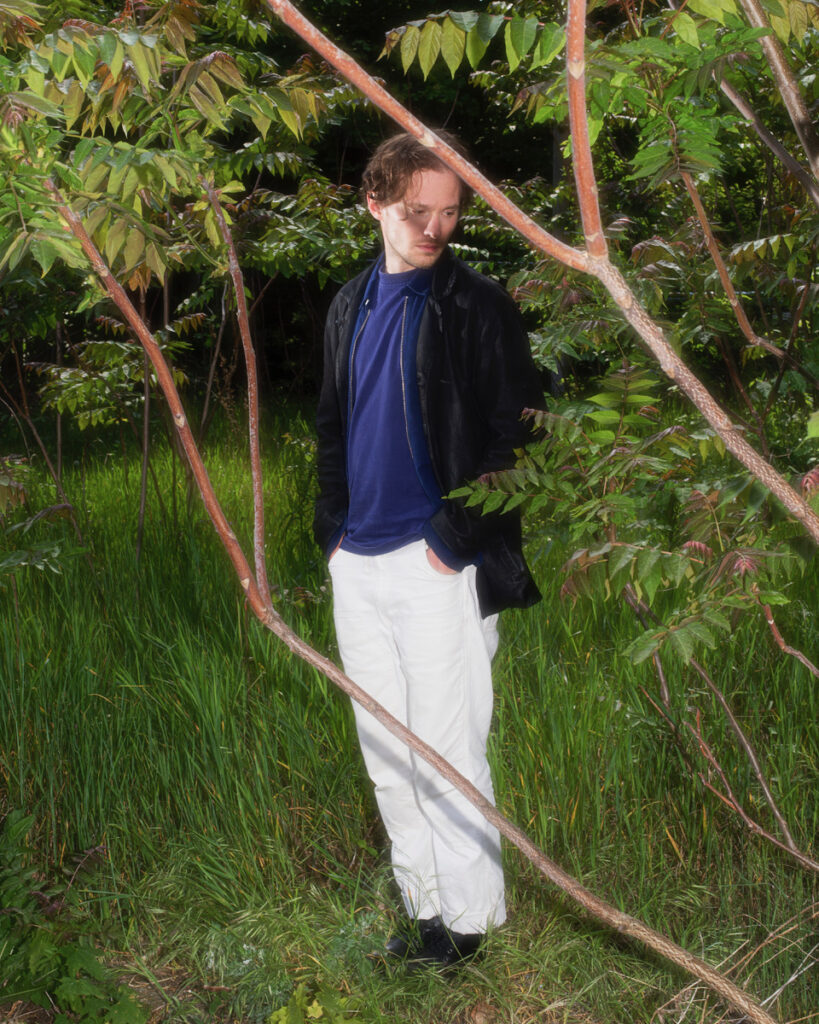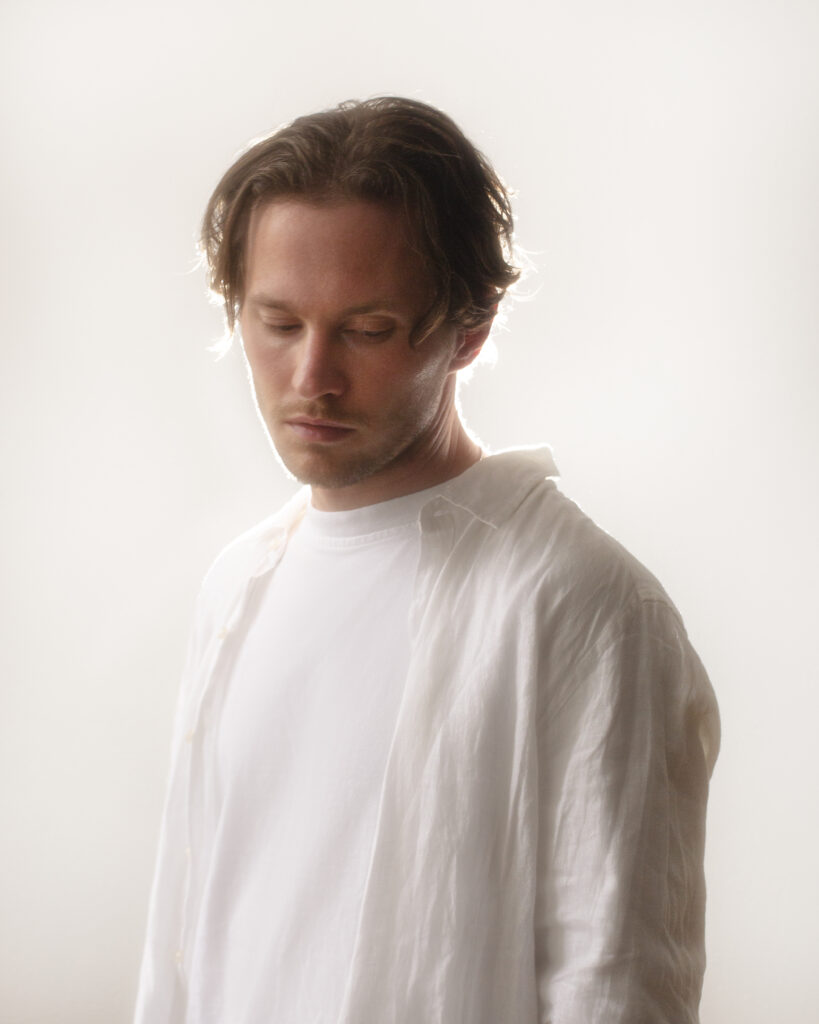David August si distingue come un visionario compositore e architetto del suono. Maestria tecnica e spiccata sensibilità musicale: queste le sue più grandi doti, attraverso le quali riesce ad incantare l’essere umano, trascinandolo con sé verso nuove realtà sensoriali.
Intrisa di profonda introspezione, la sua musica si manifesta come un continuum di emozioni che si dipanano attraverso melodie spirituali e ritmi palpitanti. August è un narratore abile, capace di tessere storie avvincenti che catturano l’immaginazione e si insinuano nell’anima.
La sua produzione, sorprendente per la sua varietà e originalità, sfida i confini del genere, intrecciando elementi di ambient, house e techno in un’unica sinfonia evocativa. La sua padronanza nell’usare gli strumenti elettronici come estensioni della sua creatività lo rende un virtuoso moderno, capace di plasmare il suono in qualcosa di veramente unico.
David August è più di un semplice artista elettronico; è un poeta sonoro che esplora i recessi dell’esperienza umana.
Lo abbiamo intervistato in seguito alla sua esibizione al Dancity festival.

Ciao David, VIS: dalle origini alle stelle; dalla classica alla dance. Puoi condividere alcuni momenti significativi che hanno influenzato, passo dopo passo, la composizione musicale del tuo nuovo album?
Ciao Andrea, grazie dell’invito. Penso che le ispirazioni più fondamentali siano arrivate durante un periodo di introspezione in cui mi sono ritrovato a osservare il mondo che ci circonda in modo più olistico. Durante questo periodo caotico in cui ci siamo trovati – ed in cui ancora ci troviamo – cercavo speranza e consolazione nell’immaginazione. Sentivo l’esigenza di tornare indietro nel tempo, tentando un racconto alternativo attraverso il suono. Passato, presente, utopia. Il risultato è estremamente soggettivo e rappresenta solo un modo di vedere le cose da un altro punto di vista. Era un periodo in cui la fisica quantistica, così come le filosofie orientali, hanno avuto un impatto fondamentale su di me, parlo della fine del 2019/inizio 2020. Poi ci è voluto del tempo per trasformare ciò che ho integrato nella mia personalità in musica. Alla fine, l’influenza dietro al disco deriva piuttosto da un percorso personale.
In “VIS” percepisco una profonda connessione emotiva tra te il mondo circostante. Questo riflette un profondo cambiamento e una nuova fase della tua vita? Come descriveresti l’evoluzione della tua espressione artistica nel corso degli anni?
Fino a qualche anno fa, la musica che facevo era più concentrata su me stesso. Mi ero stufato di vedere il mio ego così coinvolto nel lavoro che facevo. Potevo sempre percepire un conflitto perché non ero in grado di lasciar andare e accettare un’identità musicale che potesse appartenere a me. VĪS è un primo tentativo di mettere da parte questo ego e far parlare la musica, seguendo il suo flusso e non impedendo una evoluzione naturale. Non riesco ancora a capire se ci sono riuscito, perché l’esperienza di vita che ognuno di noi porta con sé farà sempre parte della propria attività creativa. E penso sia giusto così. Anche se fallito o meno, penso che sia stato un processo fondamentale a livello personale e artistico per avvicinarmi a questo mezzo con più purezza e onestà.
La tecnologia ha svolto un ruolo significativo nel cambiamento della musica. Come l’hai utilizzata nella produzione e come pensi abbia influenzato il tuo modo di pensare alla musica?
Molto vero. Può essere di grande aiuto, ma dobbiamo fare attenzione a non concedere troppo controllo alla tecnologia, altrimenti rischiamo di perdere la nostra anima. È importante mantenere una consapevolezza. Riguardo all’uso personale, sono abbastanza old school. Uso pochi strumenti e normalmente i processi avvengono con mezzi semplici. È piuttosto la quantità di manipolazioni che mi porta a risultati interessanti, ma non necessariamente uno strumento in particolare.
Le tue performance dal vivo sono note per la loro intensità ed energia. Come riesci a tradurre l’atmosfera dei tuoi album nelle esperienze live? Ci sono elementi che ritieni essenziali durante le esibizioni?
L’album è un veicolo per l’esperienza dal vivo. Soprattutto in questo caso c’era prima l’idea dello spettacolo e poi la conseguenza necessaria del disco. La condivisione, ma anche il coinvolgimento di altre discipline come la luce e, in questo caso, la danza, sono essenziali per esprimere meglio ciò che mi premeva dire. L’ascolto collettivo e l’esperienza live sono sempre stati ciò che mi interessava di più rispetto all’ascolto solitario. Commuovere l’ascoltatore è sempre il desiderio, e se ciò dovesse accadere dopo uno spettacolo, non potrei essere più felice.
Come artista, senti di avere un ruolo nella società al di là della creazione di musica? Qual è il tuo punto di vista sull’importanza dell’arte nel contesto sociale e culturale?
Penso che ognuno di noi abbia un piccolo ruolo nella società, consapevolmente o inconsapevolmente. Come persona che si espone pubblicamente, la responsabilità cresce a causa della visibilità e dell’influenza che si può avere. Voglio credere nel fare del bene con qualsiasi mezzo una persona ha a disposizione. E ne abbiamo bisogno più che mai. Nel mio caso, posso provare e contribuire attraverso la musica. Ma con questo viene anche una grande autocritica, considerando sempre se ciò che ho creato potrebbe avere rilevanza o meno. Possiedo musica inedita che probabilmente non vedrà mai la luce del giorno, perché non mi convince abbastanza per occupare un posto prezioso nel nostro mondo digitale (e fisico).
Hai dei rituali creativi o delle abitudini che segui prima di immergerti nel processo di creazione della musica? Come cerchi di mantenere viva l’ispirazione e l’energia cosmica interiore?
Dipende dallo stato interno in cui mi trovo e anche se me lo posso permettere. Ci sono momenti di calma in cui riesco a connettermi più facilmente a un atto creativo. A volte ho il desiderio di praticare più meditazioni come preparazione, ma in periodi come questi in cui i processi creativi accadono nel momento in cui ho due minuti liberi, è difficile. Al momento per me è un privilegio avere tempo a disposizione e poterlo gestire come vorrei. Quando stavo ancora scrivendo il disco, ero in questa fase libera con poche responsabilità. Ma dall’uscita del disco e dal tour di questo autunno, le cose sono cambiate e devo cercare questi pochi momenti che ho a disposizione e renderli produttivi. Quello che mi aiuta è anche il movimento.

Quanto è importante trascendere i limiti del visibile per raggiungere l’invisibile?
Domanda interessante e difficile da rispondere. Secondo me dipende da quanto senti l’esigenza di entrare in uno spazio poco conosciuto. L’invisibile è ignoto ma ti può permettere di allinearti più profondamente con ciò che ci circonda. Non tutti magari si sentono a loro agio nel voler connettersi a qualcosa che è poco tangibile e non familiare. E va bene così se non sentono la mancanza. Per me, era un processo importante ed esplorativo perché mi ha a portato più consapevolezza — che a volte può essere anche turbante. L’invisibile è il mistero della nostra esistenza, no?
ENGLISH VERSION
David August stands out as a visionary composer and sound architect. Technical mastery and a heightened musical sensitivity are his greatest attributes, through which he manages to enchant the human being, leading them towards new sensory realities.
Steeped in profound introspection, his music unfolds as a continuum of emotions through spiritual melodies and pulsating rhythms. August is a skillful storyteller, capable of weaving captivating tales that capture the imagination and insinuate themselves into the soul.
His production, remarkable for its variety and originality, challenges genre boundaries, intertwining elements of ambient, house, and techno into a singular evocative symphony. His proficiency in using electronic instruments as extensions of his creativity makes him a modern virtuoso, capable of shaping sound into something truly unique.
David August is more than just an electronic artist; he is a sonic poet exploring the depths of the human experience.
Hello David, VIS: from origins to the stars; from classical to dance. Can you share some significant moments that have influenced, step by step, the musical composition of your new album?
Hello Andrea, thank you for the invitation. I believe the most fundamental inspirations came during a period of introspection where I found myself observing the world around us more holistically. During this chaotic period we found ourselves in—and still find ourselves in—I was seeking hope and solace in imagination. I felt the need to go back in time, attempting an alternative narrative through sound. Past, present, utopia. The result is extremely subjective and represents just one way of seeing things from a different perspective. It was a time when quantum physics, as well as Eastern philosophies, had a fundamental impact on me, around the end of 2019/beginning of 2020. Then it took time to transform what I integrated into my personality into music. In the end, the influence behind the record derives more from a personal journey.
In “VIS,” I perceive a deep emotional connection between you and the surrounding world. Does this reflect a profound change and a new phase of your life? How would you describe the evolution of your artistic expression over the years?
Until a few years ago, the music I made was more focused on myself. I got tired of seeing my ego so involved in the work I did. I could always sense a conflict because I couldn’t let go and accept a musical identity that could belong to me. VĪS is a first attempt to set aside this ego and let the music speak, following its flow and not hindering a natural evolution. I still can’t understand if I succeeded because the life experience each of us carries will always be part of our creative activity. And I think that’s right. Even if successful or not, I think it was a fundamental process on a personal and artistic level to approach this medium with more purity and honesty.
Technology has played a significant role in the evolution of music. How have you used it in production, and how do you think it has influenced your approach to music?
Very true. It can be of great assistance, but we must be careful not to grant too much control to technology, or we risk losing our soul. It’s important to maintain awareness. Regarding personal use, I’m quite old school. I use few tools, and processes usually occur through simple means. It’s more the quantity of manipulations that leads me to interesting results, but not necessarily a specific instrument.

Your live performances are known for their intensity and energy. How do you translate the atmosphere of your albums into live experiences? Are there elements you consider essential during performances?
The album is a vehicle for the live experience. Especially in this case, there was the idea of the show first, and then the necessary consequence of the record. Sharing but also involving other disciplines like light and, in this case, dance are essential to better express what I wanted to convey. Collective listening and the live experience have always been what interests me most compared to solitary listening. Moving the listener is always the desire, and if that were to happen after a show, I couldn’t be happier.
As an artist, do you feel you have a role in society beyond creating music? What is your perspective on the importance of art in the social and cultural context?
I believe each of us has a small role in society, consciously or unconsciously. As someone who exposes themselves publicly, responsibility grows due to the visibility and influence one can have. I want to believe in doing good with whatever means a person has at their disposal. And we need it more than ever. In my case, I can try to contribute through music. But with this comes great self-criticism, always considering whether what I’ve created might or might not be relevant. I have unreleased music that probably will never see the light of day because it doesn’t convince me enough to occupy a valuable space in our digital (and physical) world.
Do you have creative rituals or habits you follow before diving into the music creation process? How do you try to keep inspiration and inner cosmic energy alive?
It depends on the internal state I find myself in and if I can afford it. There are moments of calm when I can more easily connect to a creative act. Sometimes I have the desire to practice more meditations as preparation, but in periods like these where creative processes happen in the few free moments I have, it’s challenging. Currently, it’s a privilege for me to have time available and be able to manage it as I wish. When I was still writing the album, I was in this free phase with few responsibilities. But since the album’s release and the tour this fall, things have changed, and I have to seek these few moments I have and make them productive. What also helps me is movement.
How important is it to transcend the limits of the visible to reach the invisible?
An interesting and challenging question to answer. In my opinion, it depends on how much you feel the need to enter an unfamiliar space. The invisible is unknown but can allow you to align more deeply with what surrounds us. Perhaps not everyone feels comfortable wanting to connect with something intangible and unfamiliar. And that’s okay if they don’t feel the need. For me, it was an important and exploratory process because it brought me more awareness — which can sometimes be unsettling. The invisible is the mystery of our existence, isn’t it?
Thank you.
